Caitlyn Jenner, a long-time California resident and Fox News contributor, has voiced her criticism of California’s leadership, particularly Governor Gavin Newsom, for their handling of the recent wildfires that ravaged parts of Los Angeles County. Jenner, who has resided in the state since 1973, laments what she perceives as a decline in California’s governance, attributing the state’s troubles to the policies of the Democratic party, which has held a dominant position in California politics for decades. She believes the current wildfire crisis will serve as a wake-up call for Californians, potentially leading to a shift in political allegiances.
Jenner draws a parallel between the politicians’ responses to recurring problems and the arcade game “whack-a-mole,” where players react to isolated issues as they arise rather than addressing the underlying systemic problems. She argues that the government’s reactive approach to the wildfires, instead of proactive measures such as improved forest management and updated water infrastructure, is indicative of a broader pattern of mismanagement. She emphasizes the importance of preparedness, suggesting that officials should be focusing on prevention and mitigation efforts well in advance of fire season rather than scrambling to react once the flames have ignited.
The management of water resources is a key point of contention for Jenner. She highlights California’s aging water infrastructure, specifically referencing the California Aqueduct, a major water conveyance system constructed in the 1960s. Jenner argues that subsequent administrations have failed to adequately invest in and modernize the state’s water systems, leaving California vulnerable to drought and hindering effective firefighting efforts. She points to the irony of the state being forced to release vast amounts of rainwater into the ocean due to inadequate reservoir capacity, despite facing persistent drought conditions. This, she believes, underscores a critical failure in long-term planning and resource management.
Jenner expresses her frustration with what she perceives as misplaced priorities within the state government. She contends that the focus on social programs and other liberal initiatives has come at the expense of essential infrastructure and disaster preparedness. This, she argues, has left California ill-equipped to deal with natural disasters like the recent wildfires, exacerbating the devastation and putting lives and property at risk. She believes that a fundamental shift in political thinking is necessary to address these systemic issues and restore California to its former glory.
Furthermore, Jenner argues that the recent wildfires, combined with the perceived failures of the current administration, will contribute to a growing Republican presence in California. She points to the shrinking “blue” areas on the state’s electoral map as evidence of this trend, suggesting that areas outside of the major metropolitan hubs are increasingly leaning towards the Republican party. She believes that the mishandling of the wildfire crisis will further solidify this trend, as residents become disillusioned with the Democratic party’s leadership.
Jenner is hopeful that the current crisis will act as a catalyst for change. She believes that the stark realities of the wildfire devastation will force Californians to re-evaluate their political allegiances and consider alternatives to the long-standing Democratic dominance. She characterizes the current political landscape in California as a “scam,” alleging that the Democratic party exerts undue influence through its control of finances, votes, and unions. Jenner believes that breaking this perceived stranglehold is essential for the state’s future prosperity and safety. She anticipates a shift in the political landscape, driven by the desire for more effective leadership and a renewed focus on crucial issues like infrastructure and disaster preparedness.

